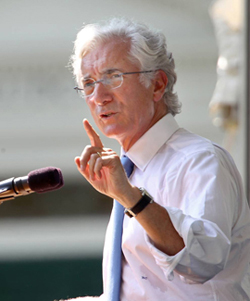Sir Ronald Cohen Offers Class Day Advice to MBA Class of 2010
|
BOSTON, May 27, 2010 —Before a sun-drenched audience of 901 Harvard MBA candidates, their families, and friends, Sir Ronald Cohen (MBA 1969), cofounder and former chairman of Apax Partners, one of the world’s preeminent venture capital and private equity firms, delivered the annual Class Day Distinguished Speaker address yesterday afternoon. Noting that interest in entrepreneurship and venture capital was just beginning to catch on at HBS and elsewhere when he was earning his MBA (“Those were the days of big corporations,” he said), he urged graduating students to do all they could to help the causes of social entrepreneurship and social venture capital as these fields gather momentum in the early part of the 21st century.  Sir Ronald Cohen (MBA 1969) makes a point
Sir Ronald Cohen (MBA 1969) makes a pointPhoto: Harvard Business School “The reality is that our brains and skills have never been applied with the same consistency, the same intensity of effort, the same focus in dealing with social issues as they have been in building companies,” Cohen said. “In fact, these same skills are capable of transforming social issues.” Accomplishing this is all the more important, he noted, in a world where the gap between rich and poor continues to grow, despite a rising standard of living. Governments are at a loss as to what to do, he continued, and thus they turn to people with the skills like those held by Harvard MBAs to help them. Cohen speaks from considerable personal experience. In 2000, he accepted a call from the British government to lead the Social investment Task Force to examine the problems of poverty in England. And in 2005, he left Apax partners to focus all his attention on trying to improve the lives of the disadvantaged in Britain and the Middle East. He currently chairs Bridges Ventures, a private investment company that raises funds to achieve dedicated social and/or environmental goals, and the Portland Trust, which is committed to promoting peace and stability between Palestinians and Israelis through economic development. “People don’t want charity; they want a chance,” Cohen said. “If you can provide capital to areas that are starving for it, you will find levels of motivation that are higher than they are in the mainstream economy. The fact that these entrepreneurs are not formally trained in the way that we are here at Harvard Business School is more than compensated for by the obstacles they have learned to surmount and their ability to survive.” Cohen also spoke of the draw and power of entrepreneurship as well as the opportunities and rewards that come with taking reasonable risks. The prevalence of companies such as Intel, Microsoft, Sun, Oracle, and Cisco, he said, has transformed economies in the United States, Europe, and the rest of the world. "Unlike in my student days there’s no longer a question about whether it’s more prestigious to run your own company rather than work for a large one. The ’talented athletes’ in terms of business are prepared to take on the biggest challenge, which is to create a new venture." Cohen offered the MBAs-to-be three takeaways as they prepare to put their HBS lessons into practice:
Cohen graduated from Oxford University in 1967, where he studied philosophy, politics, and economics. He is the author of the 2007 book The Second Bounce of the Ball: Turning Risk into Opportunity (Weidenfeld & Nicolson). |
About Harvard Business School
Harvard Business School, located on a 40-acre campus in Boston, was founded in 1908 as part of Harvard University. It is among the world's most trusted sources of management education and thought leadership. For more than a century, the School's faculty has combined a passion for teaching with rigorous research conducted alongside practitioners at world-leading organizations to educate leaders who make a difference in the world. Through a dynamic ecosystem of research, learning, and entrepreneurship that includes MBA, Doctoral, Executive Education, and Online programs, as well as numerous initiatives, centers, institutes, and labs, Harvard Business School fosters bold new ideas and collaborative learning networks that shape the future of business.
